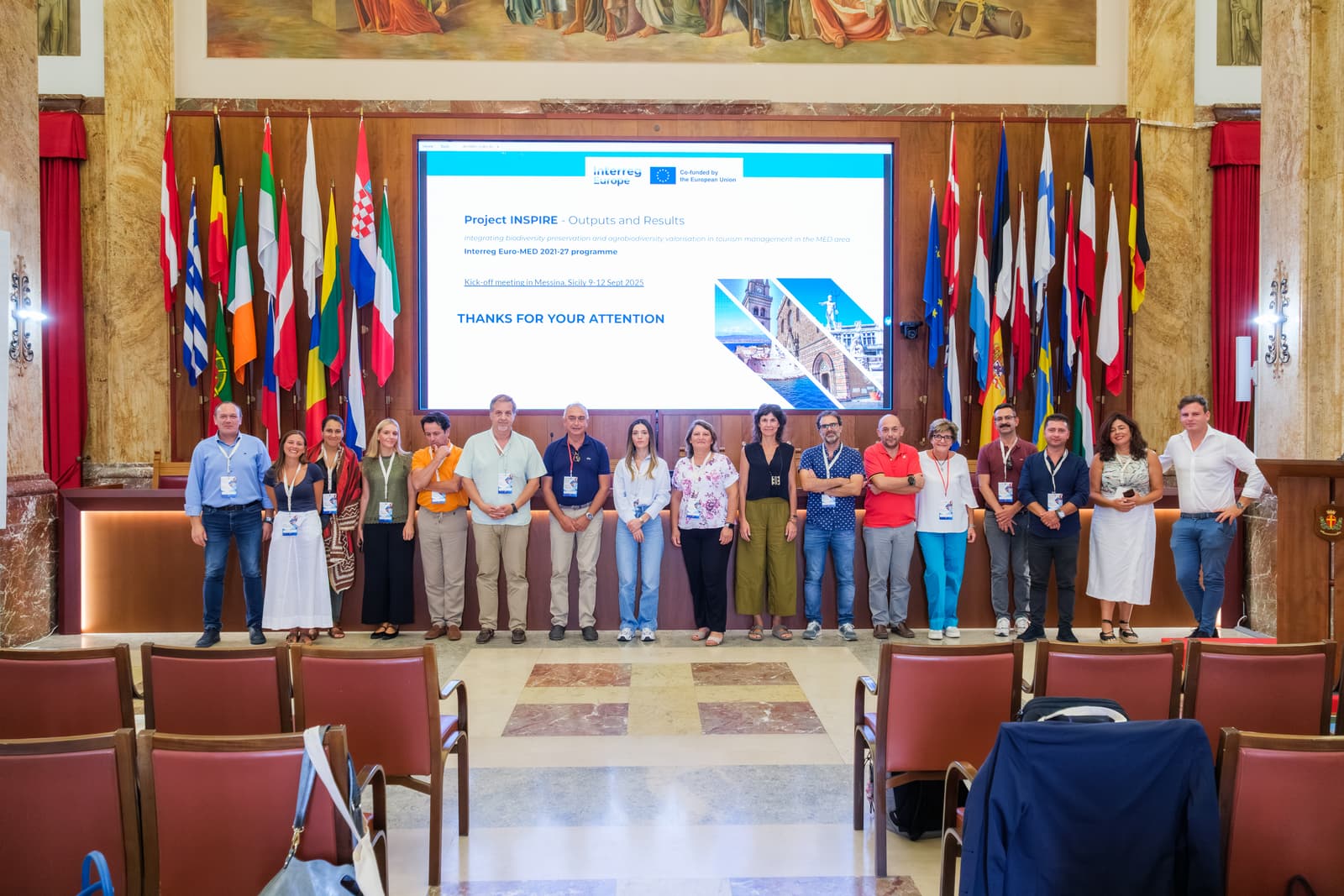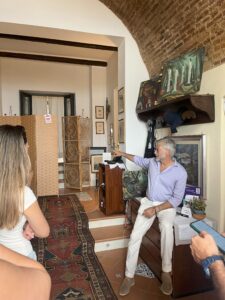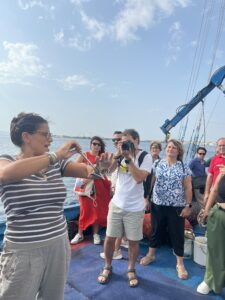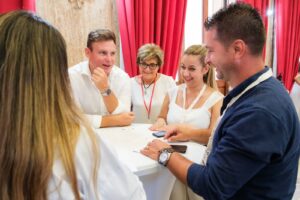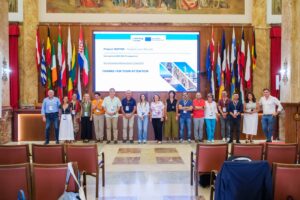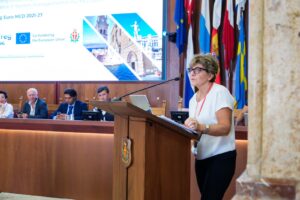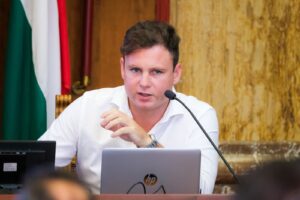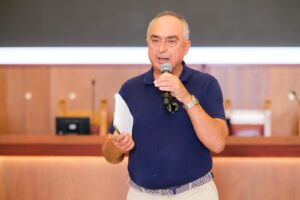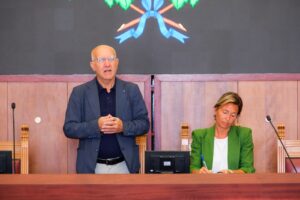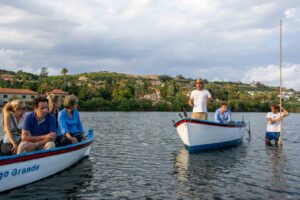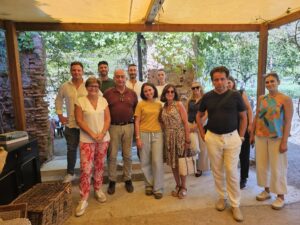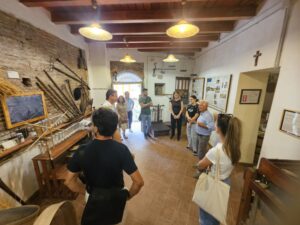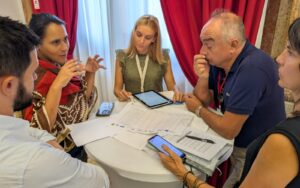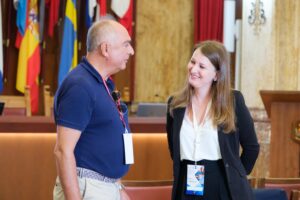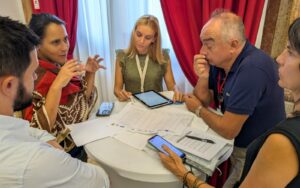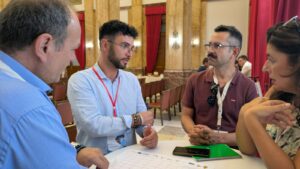From 9 to 12 September 2025, the historic heart of Messina became a hub of European collaboration, hosting the first Inception Conference and Steering Committee of the project INSPIRE – Integrating Biodiversity Preservation and Agrobiodiversity Valorisation in Tourism Management in the MED Area, co-financed by the Interreg Euro-MED 2021-2027 programme. Against the backdrop of the majestic Palazzo Zanca and its Salone delle Bandiere, Messina Municipality welcomed experts, institutions, and local stakeholders to explore the Mediterranean’s natural and cultural wealth.
Opening Day: Partner Collaboration in an Iconic Setting
On Tuesday, 9 September 2025, the Salone delle Bandiere hosted the first day of the 4 days partners’ Meeting, reserved for project partners from Italy, Spain, France, Greece, and Albania. The morning saw a presentation of the Interreg Euro-MED Programme and the INSPIRE project, followed by partners sharing insights on their roles and expectations. The session also featured the thematic Community Project (C4T) of the Sustainable Tourism Mission, highlighting opportunities for synergies and collaboration.
“Hosting the first day of the INSPIRE partners’ meeting in Messina – Federico Basile, Mayor of Messina – was an excellent opportunity to showcase our commitment to sustainable tourism and to exchange knowledge with our European partners. Events like this allow us to explore synergies, strengthen collaborations, and ensure that localin itiatives are aligned with broader Euro-MED strategies for resilient and inclusive tourism development.”
Inception Workshop: Sharing Knowledge and Methodologies
The afternoon session transformed the Salone into a lively laboratory of ideas and experience, as the Inception Workshop, moderated by EuroVértice Consultants, encouraged dialogue between partners on strategies, methodologies, and best practices to be integrated in the project methodology. Here, theoretical frameworks met local realities, and the foundations were laid for translating Mediterranean biodiversity into sustainable tourism opportunities.
“The true value of a EuroMED project goes beyond local results – Carlos Egio ,EuroVértice Consultant in the Enviroment Department has declared – The ability to inspire and transform other contexts is fundamental. Our role in INSPIRE is to ensure that the methodologies developed are systematized and disseminated, enablingo ther Mediterranean territories to adopt, adapt, and translate them into concrete sustainable tourism policies. Weaim to build strong networks, foster alliances, and promote the adoption of practices that combine innovation, resilience, and territorial cohesion, making the INSPIRE approach a replicable and exemplary model at the European level.”
A special highlight was a workshop session led by Michela Lenta, representative of Slow Food’s Biodiversity Office, who introduced participants to the Slow Food methodology for biodiversity mapping, showing how participatory approaches can engage communities while documenting and protecting local agrobiodiversity.
“Through participatory approaches, – Michela Lenta explained – we can actively engage communities while documenting and protecting local agrobiodiversity. Over decades of experience, Slow Food has shown that this methodology not only maps biodiversità but also strengthens local communities, fosters awareness of traditional food systems, and empowers people to take an activerole in preservino their cultural and natural heritage. During the workshop, participants experienced first hand how these approaches bring biodiversity to life and create tangible, lasting impact”.
Regenerative Tourism and Agrobiodiversity: Towards a Sustainable Mediterranean
The INSPIRE Inception Workshop and steering committee marked a step towards an ambitious journey to turn the Mediterranean’s natural and cultural richness into shared opportunities. Messina, with its historic squares, panoramic vistas, and vibrant local communities, stands as a European laboratory for innovation in sustainable tourism, biodiversity preservation, and Mediterranean agrobiodiversity valorisation.
The last two days of the kick-off meeting in Messina saw the partners engaged in a two-day study tour to discover the excellence of the Messina region: from traditional fishing to innovative crops.
The iniziative represented a concrete example of how biodiversity, agrobiodiversity, and experiential tourism can integrate to create a sustainable development model replicable throughout the Mediterranean.
Day One of the study tour: Maritime Traditions and Excellent Viticulture: The Feluca and the Art of Swordfish Fishing
The first day of the study tour began with the most evocative experience: a Feluca excursion to discover the ancient traditions of swordfish hunting in the Strait of Messina. The protagonist of this extraordinary experience was Giusi Arena, owner of the family business that has been dedicated to this ancient art for generations. With passion and expertise, Giusi explained how the company is run by her father and her uncle, who continues to climb the feluca’s mast, demonstrating how traditional knowledge is passed down from generation to generation.
During the navigation through the waters of the Strait, participant were able to observe traditional fishing techniques up close: spottings wordfish from the look out at the top of the mast, nearly 30 meters high, communication through gestures and coded calls between the spotter and the crew, and the use of the harpoon in a manner that has remained unchanged over the centuries.
The feluca, with its characteristic shape and structure perfectly adapted to exploit the winds and currents of the Strait, represents a perfect example of how man has adapted to the marine environment while respecting its equilibrium. The navigation, passing beneath the solemn statue of the Madonna della Lettera, offered participants an authentic experience.
Tenuta Rasocolmo: Wines with a view of Stromboli
The tour continued at Tenuta Rasocolmo, where Mr. Reitano welcomed participants to admire the local wine production amidst a stunning landscape. The vineyards, which extend over a sheer cliff overlooking the sea, offer breathtaking views of Stromboli, made even more spectacular by the volcanic plume visible on the horizon.
Francesco Reitano illustrated the distinctive features of his wines in a unique setting, enhanced by wooden sculptures and artworks distributed throughout the estate, creating a perfect blend of winemaking, art, and landscape. Visitors were able to taste local wines paired with typical local products, discovering how the Messina area and its proximity to the sea give unique characteristics to local products.
The experience highlighted how the estate represents not only a wine production center, but also a cultural space where winemaking tradition, contemporary art, and the promotion of the local area blend harmoniously.
The Ganzirri Lakes and Mussel Farming
The first day concluded with a fascinating boat trip to the Ganzirri Lakes, an extraordinary eco system that represents a perfect example of the balance between nature and traditional human activities. During the excursion, local fishermen explained clam farming techniques to participants through practical demonstrations of the various harvesting methods. In this splendidnatural setting, the local Pro Loco Association brilliantly illustrated the characteristics of this extraordinary ecosystem. The Capo Peloro Nature Reserve is home to over 400 aquatic plants pecies, with vegetation ranging from oleanders and palms to reeds and papyrus, and migratory fauna including herons, cormorants, ducks, and more. This splendid natural setting, where aquaculture is practiced according to traditional, environmentally friendly methods, offered a concrete example of how biodiversità conservation can harmoniously coexist with local production activities.
Day two of the study tour: Grain Museum of San Filippo Superiore, the Guardian of Tradition
The second day began with a visit to the Grain Museum of San Filippo Superiore, an associated partner museum that preserve sancient agricultural techniques and traditional tools from the past.
The museum is the fruit of the passion and dedication of Mr. Bebba, who dedicated much of his life to collecting and preserving the traditions and knowledge of the past, particularly regarding the wheat harvest.
Among the most valuable exhibits are traditional musical instruments, with a particular focus on the bagpipe, a testament to how music has always accompanied agricultural work and harvest time. The museum is an important center of ethnomusicology, wherepopular musical traditions linked to the rural world are studied and preserved.
Thanks to the work of several young local people and the precious cultural heritage collected by Mr. Bebba, these rural traditions are documented through the production of videos and multimedia materials that preserve not only agricultural techniques, but also the musical repertoires and songs that accompanied them.
The museum is not only a place of memory, but also an active center where traditional activities such as beekeeping are promoted, demonstrating how ancient knowledge can be passed on to new generations through innovative and multimedia approaches.
Tenuta Villarè: Where Tradition and Innovation Meet
The study tour concluded at Tenuta Villarè, a shining example of how traditional crops can be combined with innovative experimentation. In addition to local production, the company has successfully developed the cultivation of South American species such as avocados, mangoes, and passion fruit. Tenuta Villarère presents a model of intelligent adaptation that should inspire a new Mediterranean agriculture: no longer simply preservino traditions, but also the ability to evolve responsibly to exploit new climatic opportunities without compromising the local identity.
A Model of Sustainable Experiential Tourism
The iniziative fits perfectly with the objectives of the INSPIRE project, which aims to integrate biodiversità conservation and the enhancement of agrobiodiversity into tourism management in the Mediterranean region. The two-day study tour demonstrated how the Messina area offers an extraordinary heritage of traditions, innovations, and landscapes that can become attractions for conscious and sustainable tourism.

